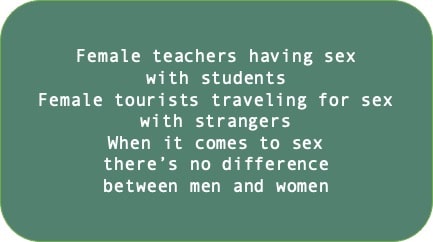
There is nothing new about female sex tourism. It’s only that women who travel for sex have been more discreet than men who do.
Female sex tourism
The Cannes Film Festival is famous for launching modest films into worldwide acclaim. Some of those films even become blockbusters. That was the case, for example, with Fahrenheit 9/11 (2004), Pulp Fiction (1994), and Apocalypse Now (1979).
Paradise: Love seems destined for similar acclaim, even if not success. It premiered at this year’s festival last week. But the phenomenon of Fifty Shades of Grey previewed its success.
Paradise: Love dramatizes middle-aged European women traveling to Africa for sexual satisfaction. And it does so in graphic and sadomasochistic fashion.
Never mind that Spike Lee’s iconic film Jungle Fever seems a more appropriate name for this film. In a relatively tame fashion, it dramatizes an interracial affair in New York City.
Sex tourism: Middle-age, middle-class White women
Except that, in Paradise: Love, these women look more like Judi Dench than Juliet Binoche. They’re not very convincing as cougars. And the “Kenyan beach boys” they pursue seem more like their willing prey.

What is interesting, though, is that most men travel to exotic places in Asia. By contrast, most women travel to exotic places in Africa and the Caribbean. Which belies all the times they told (White) men back home that size doesn’t matter…
Heading South (2005) also dramatizes this cross-cultural phenomenon. But it does so in a more provocative and titillating fashion.
It features middle-aged White women traveling to Haiti for sex. They travel every year to get their groove on with beach boys quite willing and able to service them.
But this bit of paradise does not come cheap. Because “beach boys” is just a colloquial term for Black gigolos. And they prey on these White “Sugar Mamas” for cash as much as these women prey on them for sex.
Yes, How Stella Got Her Groove Back (1998) was a sensation. It reportedly stimulated sex tourism among middle-aged Black women. But middle-aged White women had already been getting their groove back for years.
I commented on their sex tourism in “Neo-Colonialism: British Women Traveling to Former Colonies for Sex,” November 27, 2007.
Female sex tourism vs. male sex tourism
It turns out that women travel (most often) for consensual, exotic sex with Black men. Whereas men travel (too often) for pedophile, exploitative sex with boys and girls.
Moreover, reports abound about women becoming emotionally attached to their prostitutes. Men rarely, if ever, do. In fact, stereotypical female emotions are on full display in Paradise: Love.
For example, the lead cougar becomes hysterical when she finds out that her Kenyan beach boy lied about his personal life. And the way she deals with her antic feelings of betrayal is straight out of Looking for Mr. Goodbar (1977).
In any event, I realized long ago that women have the same sexual needs and desires as men. And that they are every bit as adventuresome.
After all, Cleopatra’s lust for power and sex rivaled that of any man in history. And she went on many adventures in pursuit of satisfaction.
Only social taboos and lack of opportunity have prevented women from having their way with men. That is, the way men have always had with them.
Paradise: Love portrays what the women’s movement has liberated in this respect.